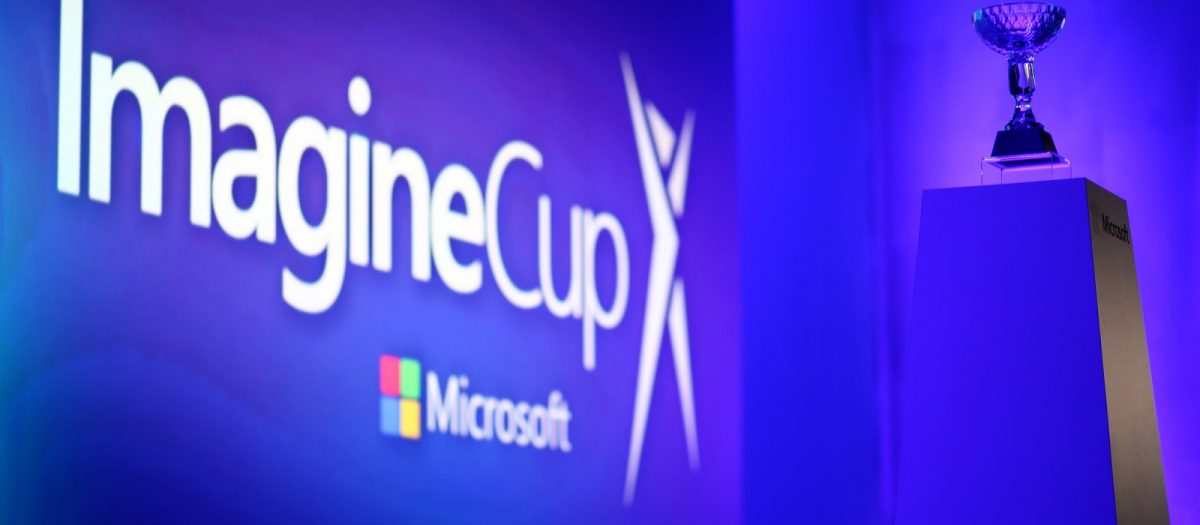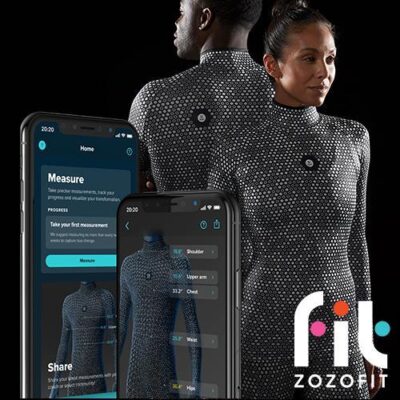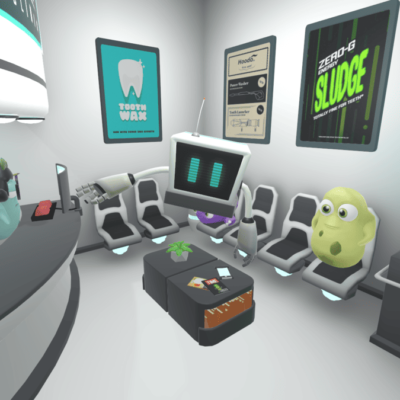After a fantastic #MSBuild2017 Tech Trends is heading back to Seattle for the Imagine Cup
Now in its 15th year, the Microsoft Imagine Cup brings together some of the world’s smartest students to create solutions with the potential for global impact. 54 teams from all around the world will come together at Microsoft’s Redmond HQ to compete now only for a $100,000 prize, but also a $120,000 Azure grant and a mentoring session with Microsoft CEO Satya Nadella himself.
The Microsoft Imagine Cup finals will take place on July 27th Share on XThe finals will take place on July 27th and we’ll be covering the stories and projects in more detail then, but in the meantime, meet the teams below!

| Team Name | Country & University | Project Name & Description |
| Nash | Argentina
Instituto Tecnologico de Buenos Aires |
Nash’s platform RESCUE was developed to reduce the response times in natural disasters. Deploying a network of economic and self-flying drones, the city is explored and analyzed in real time. |
| SourceLink | Australia
University of Melbourne |
SourceLink reconnects individuals with the producers of their food, helping them to engage with the people and the stories behind their purchases. |
| Team Parasitica | Bangladesh
Bangladesh University of Engineering and Technology |
Team Parasitica’s “fasTnosis” is a medical solution that analyzes a patient’s sputum, blood and stool samples for screening of Tuberculosis, Malaria and Intestinal Infections. |
| Scrawlless | Belarus
Belarusian State University |
Scrawlless is a platform that helps kids with cerebral palsy and other problems associated with fine motor skills do their school tasks. Team Scrawlless has also engineered a special virtual keyboard and interactive modules for non-linear counting. |
| Knowlead | Bosnia and Herzegovina
International Burch University |
Knowlead is social network learning platform where students are able to acquire and share knowledge. Approach is through peer-to-peer live communication where everyone is a student and teacher. |
| UpFish | Brazil
Universidade Estadual de Campinas |
UpFish is an intelligent solution that monitors production of fish in aquaculture systems. Use technology to help produce the most fish as possible in a fish farm. |
| Bubu Digital | Brazil
Federal University of Paraíba |
Bubu Digital has invented a smart pacifier that monitors a baby’s health through temperature and humidity sensors in order to help fight infant mortality. |
| NeuroGate | Canada
University of Waterloo |
Using Microsoft’s Kinect motion data and machine learning, NeuroGate’s software analyzes gait patterns and diagnose various neurodegenerative diseases. |
| Karate Manatees | Canada
University of Toronto |
Team Karate Manatees has developed an online multiplayer team based sports game. |
| Surgical Assistant | China
Xidian University |
Surgical Assistant’s software aims to improve issues associated with the practical problems of complex clinical surgery. Surgical Assistant provides a medical image processing platform and VR applications to view 3D models. |
| X.GLU | Czech Republic
Czech Technical University in Prague |
The X.GLU project strives to provide novel hardware and software instruments to allow diabetic patients to cope with the disease better. |
| OverSkill | France
Ecole Polytechnique |
Research has proven physical exercise stimulates intellectual development yet we have noticed there are currently few ways to develop both brainpower and body fitness at the same time. OverSkill targets seven core abilities and is designed to train the mind and the body simultaneously through the use of mixed reality. |
| SmartCase | Germany
Karlsruhe Institute of Technology |
SmartCase is an innovative combination consisting of a multi platform application and a hardware component attachable to luggage of all sorts which helps travellers to monitor their belongings and avoid thefts through signal lights. |
| Team Name | Country & University | Project Name & Description |
| koicode | Germany
Technical University of Munich |
Team koicode focuses on creative code visualization to improve readability and transparency for computer science students. |
| OsteoMentor | Greece
Aristotle University of Thessaloniki |
OsteoMentor is a project that aims to support people with osteoporosis in order to maintain and improve their life quality, providing a complete solution that utilizes state-of-the-art technologies. |
| Sense+ | Hong Kong
Hong Kong Polytechnic University |
Sense+ is a cognitive application that enables the visually impaired to see, explore, notice and search with their ears. |
| GlovEye | Hungary
Budapest University of Technology |
GlovEye has engineered tactile feedback gloves for smart devices that the blind and partially sighted people perceive printed text as Braille. |
| 3alchemists | India
Medicaps Indore |
3alchemists’ application assists and diagnose the patients of Alzheimer and other degenerative diseases and reduce the medical expenses and man-hours. |
| PocketConfident AI | India
IIT Hyderabad |
PocketConfidant AI is developing the first virtual coach powered by Artificial Intelligence. |
| Negative Time | India
BITS Pilani |
Negative Time’s “Content Holmes” is a one-click AI-based online parenting solution that help you keep your children secure from cyber-bullying and adult content online and monitor their activities. |
| CIMOL | Indonesia
Bandung Institute of Technology |
CIMOL’s web based app “Hoax Analyzer” aims to combat the proliferation of “fake news”. Leveraging NLP and ML, the app is capable of identifying if certain contextual information can be categorized as hoaxes or not. |
| NeuroVoice | Japan
University of Tokyo |
NeuroVoice converts an input voice into another person’s voice. |
| Team Name | Country & University | Project Name & Description |
| TITAMAS | Japan
Tokyo Institute of Technology |
TITAMAS has created a smart white cane device for visually impaired. |
| DocStroke | Jordan
Jubilee Institute |
DocStroke aims to provide the cheap technique to determine the risks of stroke using ocular image processing and machine learning that any rural medical institution could afford, so they could warn the stroke and prevent it from happening with all of its side effects, including deaths caused by the stroke. |
| En#l-Guard | Korea
Sejong University |
En#I-Guard’s windows application “Blinker” is designed to prevent and alleviate Computer Vision Syndrome(CVS). People who use computers for long time are likely to be exposed to CVS such as eye fatigue, blurred vision, dry eye and vision loss. |
| Bl!nk | Lebanon
American University of Beirut |
Bl!nk’s project consists of a solution that gives feedback to the user on a rehearsal of a presentation or speech he or she is preparing. |
| Eranoi | Mexico
Universidad Insurgentes, Instituto Tecnológico de Veracruz, Instituto Tecnológico de Culiacán |
To help prevent the issues from contaminated water, Eranoi has created ¨Bluedrop¨, a device that monitors the quality of the water using a set of sensors that allows to measure the conductivity, the ORP, temperature, purity level, the water pH, among other important parameters. |
| e-park | Morocco
Institut Supérieur de Génie Appliqué |
With e-park, a web and mobile solution – you would be able to see the parking space in real time, know which ones are taken, and which ones are free and head straight there, not only that but you’d also be able to reserve the empty parking space ahead of your arrival, other features include keeping track of your car in the parking lot, and in app parking service payment. |
| Echo Innovators | Nepal
Kantipur Engineering College |
Echo Innovators has engineered a wearable device for livestock that monitors health of aninmals and uploads to Azure for analysis and advice to owners. |
| GroupCram | New Zealand
University of Auckland |
A web-app that drives critical thinking in students by providing them a platform for collaborative study. |
| Beta Team | Oman
German University of Technology – Oman |
Beta Team’s ”Bee” is a app that is connected with beacons technology for retailers, with the aim to understand the context of the world around the app users. Bee’s goal is to enhance customer experience and empower retailers. |
| Opticode | Philippines
Lyceum of the Philippines University-Laguna |
Opticode’s Minerva, a virtual assistant mobile application for the visually impaired that taps on the power of the smartphone camera to identify objects in the real world. The user simply points the camera at a box of cereal, for instance, and the assistant will describe it aloud through the phone’s speakers. |
| Idea hunters | Poland
Military University of Technology |
Idea_hunters’ Elephant brings the world of IoT to the nursery. The team designed clothing to monitor a baby’s vital functions, like temperature, muscle and respiratory activity, and heart functions. |
| TaleShip | Puerto Rico
Thomas Alva Edison School |
Taleship is a platform built with one goal: making writing fun for all. In the app, users have the ability to get together in a room and write a story in real-time, taking turns like a game, each turn contributing a part to the story. |
| WaCoMo | Qatar
Qatar University |
WaCoMo provides a complete platform for interactive visualisation of water consumption happening at different outlets on any given property or land. This software will in turn encourage efficient water usage. |
| Team Name | Country & University | Project Name & Description |
| deTpression | Romania
University of Bucharest |
deTpression is a device that can not only detect the depression, but also monitor it. It allows the doctor to monitor how the disease evolves for his patients. The patient simply put the device in his room corner, and it will start monitoring and send the results on cloud, where the doctor will access them. |
| Boremeter | Russia
Higher School of Education |
Boremeter can determine which parts of the lecture were boring from the video-stream of the audience. It uses it’s own neural network to detect whether a person is listening or not, and can handle videos with quite large number of faces. |
| UTV | Russia
Moscow Institute of Physics and Technology |
UTV uses language processing and term extraction to index a stream of scientific papers (which is generated by Microsoft Research online service), and present graphical representation of scientific trends, graphs of co-authors, and topic map. |
| Evermind | Russia
Moscow State University |
Evermind’s application can help prevent drunk drivers from operating their vehicles. It uses Face API to extract face landmark features, and then machine learning algorithms on top of it to determine the state of a person via a series of tests (eye movements, reaction time, color perception). |
| Heart Sound | Singapore
Nanyang Polytechnic |
Heart Sound’s hardware and application captures continuous monitoring of ECG and heart sound signals. |
| TeamTitans | Sri Lanka
University of Moratuwa |
TeamTitans invented a wearable device that helps people with asthma and gamifies the process by assisitng them with breathing control. |
| Med x Up | Taiwan
Taiwan National Tsing Hua University |
Med x Up’s technology can detect chronic renal failure (CRF) in its earliest stages by using a Smart Urine Bag solution that monitors patients’ urine volume and velocity. |
| Welse | Thailand
King Mongkut’s University of Technology Thonburi |
Welse’s device processes bloodwork and uses a smartphone application to send results. |
| Green Jam | United Arab Emirates
American University in Dubai |
Green Jam’s project aims to turn recycling into a habit rather than a mandated task for citizens of the future. The project implements a reward system for recycling within the context of an automated recycling station, where each item thrown by the user is automatically processed and dropped into its designated recycling bin. |
| SEAT | United Kingdom
University College, London |
SEAT’s Scaffolding Exercise Assignment Tool (SEAT) tool aims to improve the learning and teaching experience in programming courses. |
| Donaco | United Kingdom
Imperial College London |
Donaco aims to revolutionise the donation industry by facilitating the relationship between charities and donors. |
| KSF.LLC | United Kingdom
Oxford University |
KSF.LLC has developed the world’s first remote and interactive farming platform for urban consumers. |
| Pocket Sized Hands | United Kingdom
Abertay University |
Developer team Pocket Sized Hands created Honeypot Espionage. An online VR multiplayer shooter focused on stealth combat. Acting as a spy, you are completely invisible when stood still, but you will begin to materialize if you move, fire a weapon or set a trap. |
| Team Name | Country & University | Project Name & Description |
| Farmalytics | United States
Stanford University |
Farmalytics uses field sensors that measure important parameters that are vital for crop growth. |
| Oculogx | United States
Georgia Institute of Technology |
Oculogx has created a mixed reality app that uses Microsoft HoloLens and Azure to improve order picking in warehouses. |
| PulsePal | United States
Princeton University |
PulsePal is a low-cost mobile tool that uses an algorithm and video camera to digitally monitor heartrate. |
| Brazilian Student Association @ Stanford | United States
Stanford University |
The Brazilian Students Association at Stanford has developed the Cheque which app allows Brazilians to access political info and provide feedback to their representatives. |
| Orai | United States
Drexel University |
The Orai app helps people improve their speech content and delivery through instantaneous, on-demand, and personalized feedback. |
| Fluency | United States
Massachusetts Institute of Technology |
Fluency is an immersive language-learning web app that connects users with native speakers. |
I wish all the teams traveling to Seattle the best of luck. I can’t wait to see what they’ve got in store for us!
You won’t want to miss any of the action, so be sure to tune into the Imagine Cup Championship via a special webcast at 9 a.m. PT on July 27 on Microsoft Imagine.
For companies looking to get into Immersive technologies such as VR/AR/MR/XR our Virtual Reality Consultancy services offer guidance and support on how best to incorporate these into your brand strategy.
Alice Bonasio is a VR and Digital Transformation Consultant and Tech Trends’ Editor in Chief. She also regularly writes for Fast Company, Ars Technica, Quartz, Wired and others. Connect with her on LinkedInand follow @alicebonasio on Twitter.









